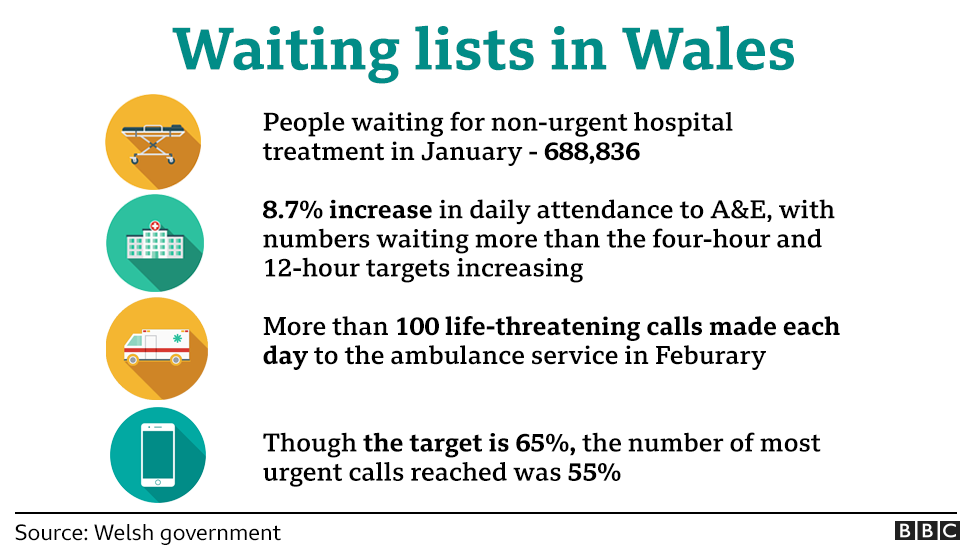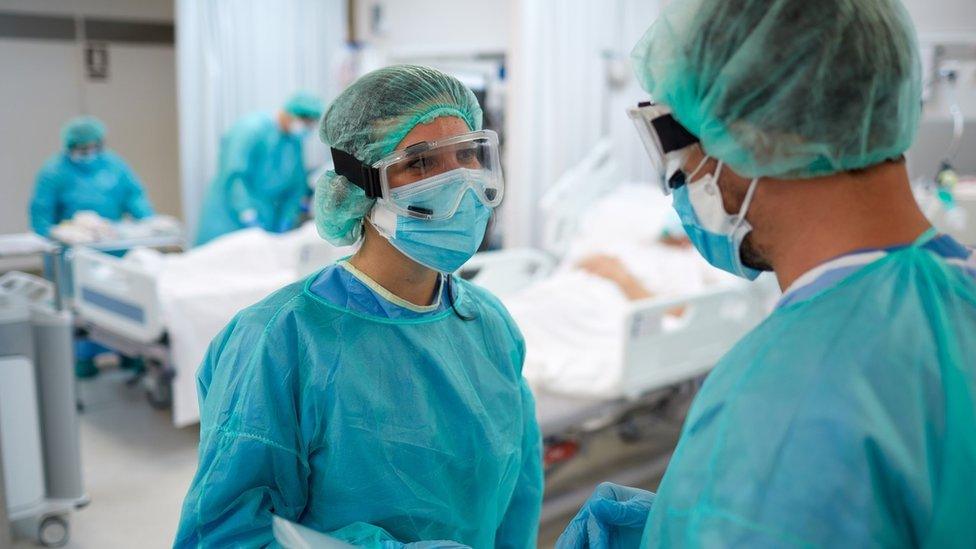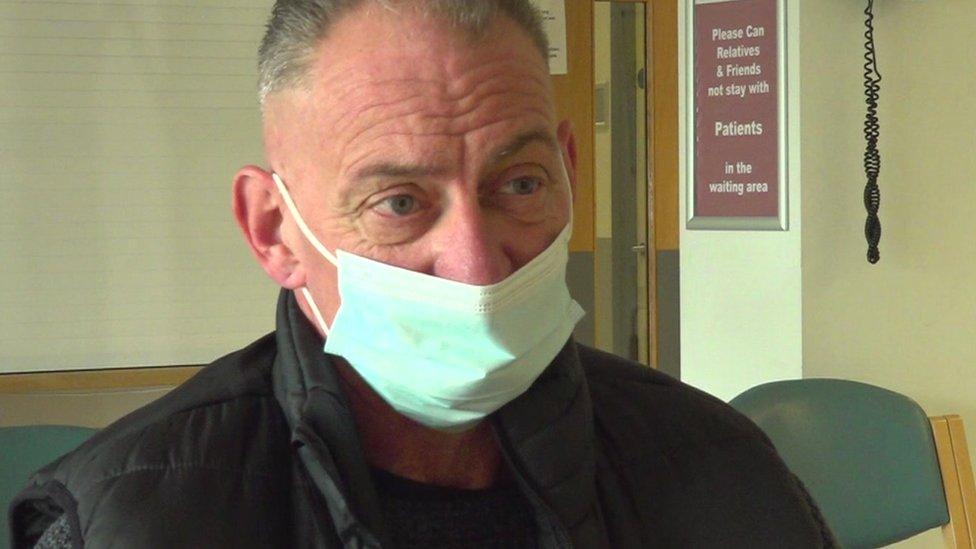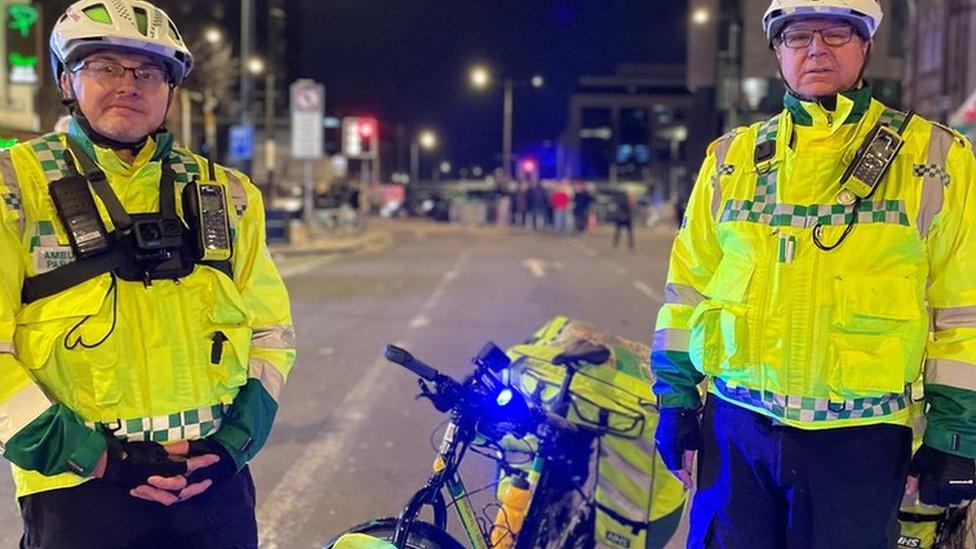NHS Wales: Record waiting lists for 21st consecutive month
- Published
- comments

Coronavirus meant staff were absent from work at the start of the year
The number of people on waiting lists for non-urgent hospital treatment in Wales has hit record levels for the 21st month in a row.
The total rose to 688,836 in January, but the rate of increase has slowed.
There was also a increase in calls to the Welsh Ambulance Service during February - the ninth month in a row that more than 100 life-threatening calls were made each day.
The Welsh government said coronavirus affected services in January.
The Royal College of Surgeons said the figures showed the "unprecedented challenge facing surgical teams and patients in Wales".
A Welsh government spokeswoman said: "The Omicron wave continues to have an impact on staffing levels, which placed a considerable strain on the NHS, with January 2022 seeing the highest level of staff sickness due to Covid since April 2020.
"Despite the number of staff absences, thanks to the heroic efforts of our NHS staff, January saw the second smallest month-on-month increase of the total waiting list since the start of the pandemic."
It comes as the Welsh Ambulance Service said it was deploying paramedics on bicycles to help deal with pressures.
A record number of patient pathways are also waiting longer than 36 weeks.

Darren Hughes, director of the Welsh NHS Confederation, said: "This month's activity and performance statistics illustrate the very real impact of the ongoing system-wide pressures on our ability to provide healthcare and support to the people of Wales.
"The human and financial costs of the pandemic will continue for years to come.
"We must be honest with the public about the ongoing challenges facing the health and care system and the staff working within it.
"With many things almost 'back to normal' in society, it's easy to forget the ever-present need for Covid vigilance in health and care that continues to affect our ability to deliver services.
"The increasing Covid transmission in the community and therefore hospitalisations continue to seriously impact on staff absence and capacity across the system whilst we are still seeing increasing numbers of people presenting with higher levels of acuity, needing more advanced treatment.
'Sky-high numbers are devastating'
"The picture remains serious and we must acknowledge the fact that Covid continues to have a huge impact on service delivery and patient care as does the difficult and challenging financial settlement."
Welsh Conservative health spokesman Russell George said: "These sky-high numbers are devastating but not shocking because, sadly, they are becoming too common - but that cannot mean that we just accept that this is what Wales gets when it deserves so much better.
"The health minister keeps saying the health boards will report back with their plans to reduce these waiting lists, but Baroness Morgan [Health Minister Eluned Morgan] should be leading them to a solution, not sitting back like a passive observer."

January saw the most NHS off with Covid-related sickness since April 2020
As one patient may be on several "pathways" to treatment, the number of patients affected will be lower.
The Welsh Ambulance Service's target of reaching the most urgent calls within eight minutes improved slightly for February, but at 55% was still well below the 65% target.
Average daily attendances to A&E during February also increased by 8.7%, with numbers waiting longer than the four-hour and 12-hour targets increasing.
In fact, more patients were waiting longer than 12 hours to be treated than in any month to date - apart from October last year.
The number of cancer pathways that were closed because the patient did not have cancer increased, but performance against the 62-day treatment target fell to the lowest proportion on record.

'I was seen within less than seven days'

Mark Cumberbatch says he's happy to be a "guinea pig" for a new system
Mark Cumberbatch, 58, from Kinmel Bay, Conwy county, has attended a Rapid Diagnostic Centre (RDC), which is intended to diagnose patients with concerning symptoms more quickly.
He had dramatic weight loss of a stone over Christmas, which he hoped was a a side-effect of a change in his diabetes treatment.
But he was happy to be a "guinea pig" for the new system to help find out what's happening to him.
"I was seen within less than seven days from when I went to see the doctor, taking bloods and coming to clinic," he said. "You can't ask for more than that."
He agreed speeding the process has helped ease the worry for him. "If they can catch things earlier, I'm just really grateful. I think it's a really good idea."

The Welsh government spokeswoman said: "Unfortunately the combination of staffing, winter pressures and the ongoing Omicron wave meant some people continue to wait longer for treatment than we would like, with the over 36-week [wait] position increasing again this month".
"Consultants continue to see all patients in order of clinical priority, with the most urgent patients seen first."
Susan Hill, a vascular surgeon in Wales and acting director for Wales at the Royal College of Surgeons, said: "Today's figures demonstrate the unprecedented challenge facing surgical teams and patients in Wales, there are now 56,515 patients waiting more than two years for treatment, a record number.
"Patients need to know there is a plan for the recovery of elective services in Wales and that plan must include strategic direction from the Welsh government to health boards on how to roll out Covid-light surgical hubs across Wales.
"We must also make sure that NHS staff communicate with patients to keep them informed about how long they will have to wait for treatment, and to make sure they are fully supported during this difficult time."
Related topics
- Published24 March 2022

- Published20 January 2022

- Published17 February 2022
